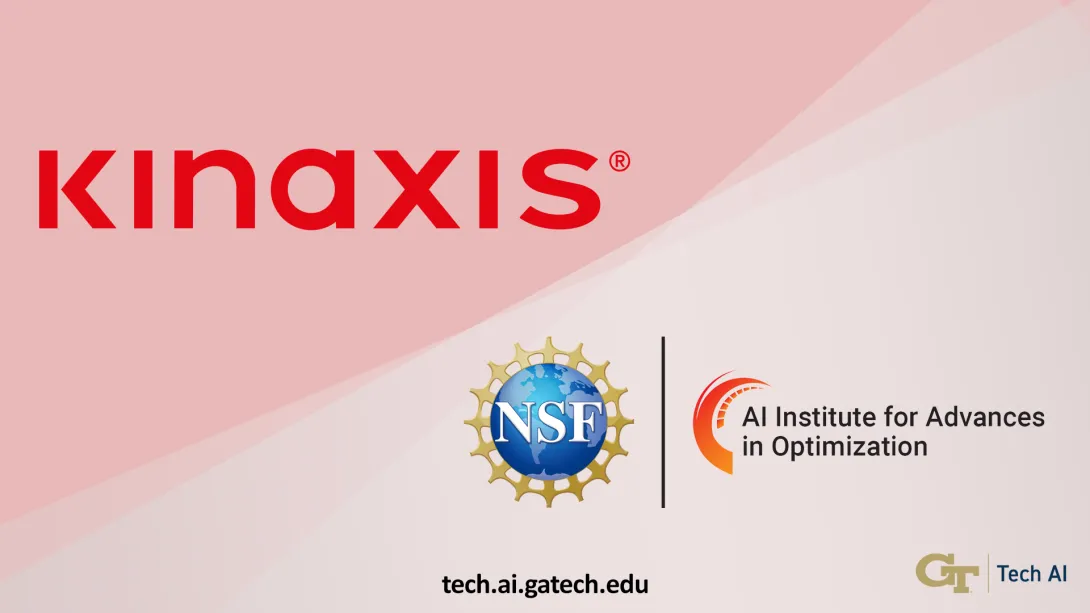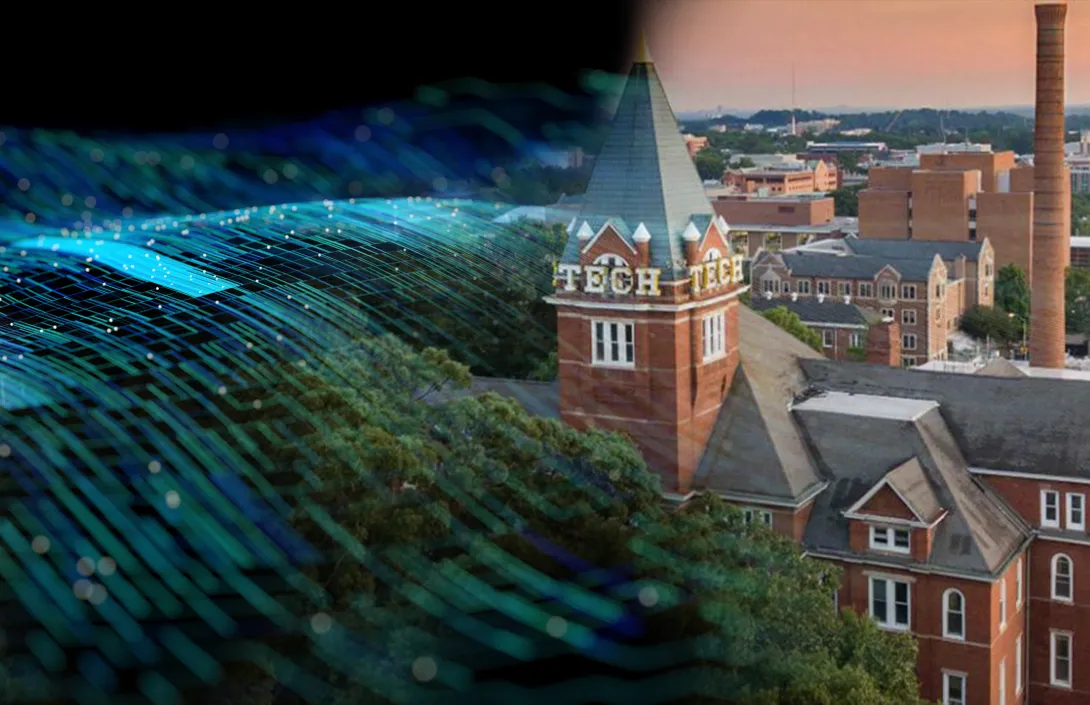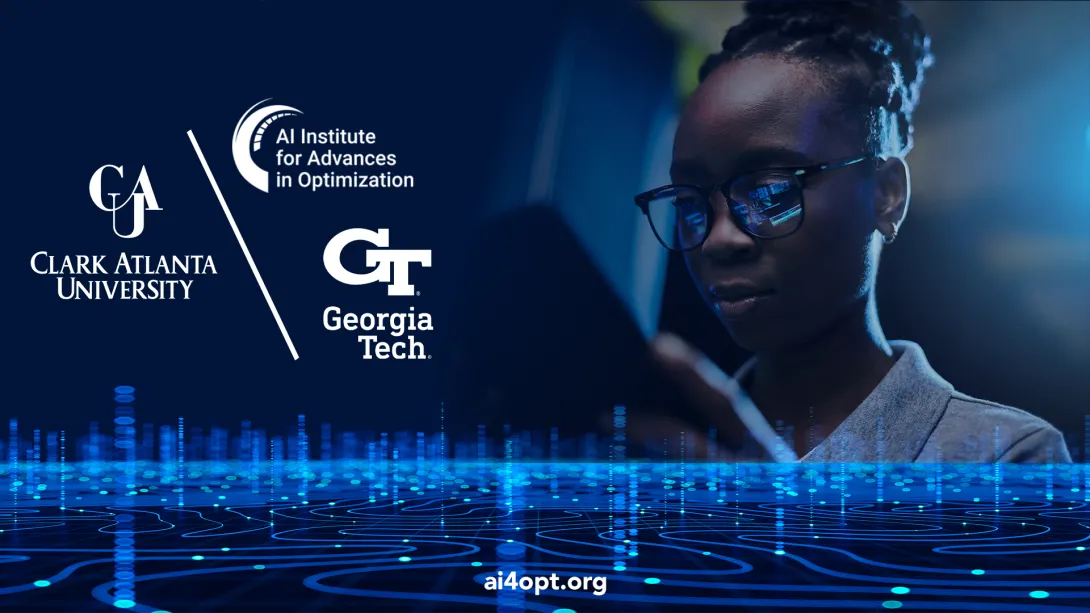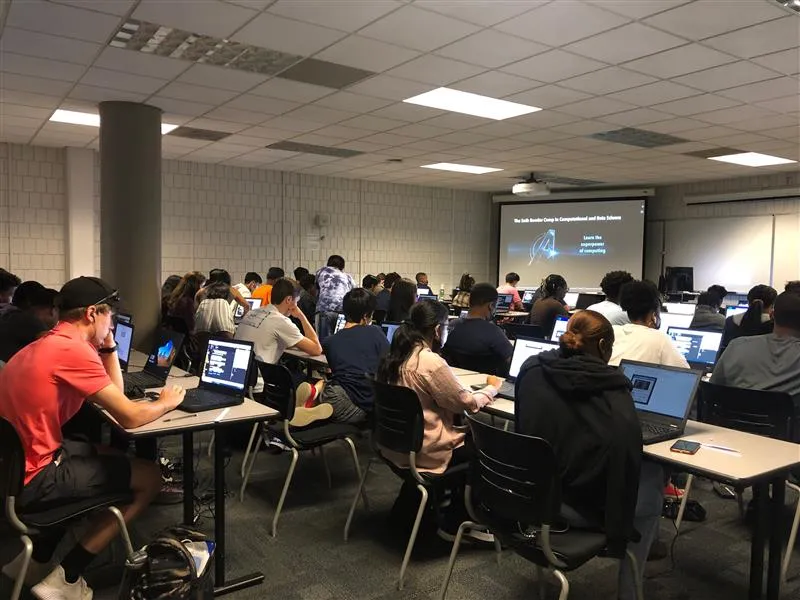Apr. 02, 2025
Kinaxis, a global leader in supply chain orchestration, and the NSF AI Institute for Advances in Optimization (AI4OPT) at Georgia Tech today announced a new co-innovation partnership. This partnership will focus on developing scalable artificial intelligence (AI) and optimization solutions to address the growing complexity of global supply chains. AI4OPT operates under Tech AI, Georgia Tech’s AI hub, bringing together interdisciplinary expertise to advance real-world AI applications.
This particular collaboration builds on a multi-year relationship between Kinaxis and Georgia Tech, strengthening their shared commitment to turn academic innovation into real-world supply chain impact. The collaboration will span joint research, real-world applications, thought leadership, guest lectures, and student internships.
“In collaboration with AI4OPT, Kinaxis is exploring how the fusion of machine learning and optimization may bring a step change in capabilities for the next generation of supply chain management systems,” said Pascal Van Hentenryck, the A. Russell Chandler III Chair and professor at Georgia Tech, and director of AI4OPT and Tech AI at Georgia Tech.
Kinaxis’ AI-infused supply chain orchestration platform, Maestro™, combines proprietary technologies and techniques to deliver real-time transparency, agility, and decision-making across the entire supply chain — from multi-year strategic orchestration to last-mile delivery. As global supply chains face increasing disruptions from tariffs, pandemics, extreme weather, and geopolitical events, the Kinaxis–AI4OPT partnership will focus on developing AI-driven strategies to enhance companies’ responsiveness and resilience.
“At Kinaxis, we recognize the vital role that academic research plays in shaping the future of supply chain orchestration,” said Chief Technology Officer Gelu Ticala. “By partnering with world-class institutions like Georgia Tech, we’re closing the gap between AI innovation and implementation, bringing cutting-edge ideas into practice to solve the industry’s most pressing challenges.”
With more than 40 years of supply chain leadership, Kinaxis supports some of the world’s most complex industries, including high-tech, life sciences, industrial, mobility, consumer products, chemical, and oil and gas. Its customers include Unilever, P&G, Ford, Subaru, Lockheed Martin, Raytheon, Ipsen, and Santen.
About Kinaxis
Kinaxis is a global leader in modern supply chain orchestration, powering complex global supply chains and supporting the people who manage them, in service of humanity. Our powerful, AI-infused supply chain orchestration platform, Maestro™, combines proprietary technologies and techniques that provide full transparency and agility across the entire supply chain — from multi-year strategic planning to last-mile delivery. We are trusted by renowned global brands to provide the agility and predictability needed to navigate today’s volatility and disruption. For more news and information, please visit kinaxis.com or follow us on LinkedIn.
About AI4OPT
The NSF AI Institute for Advances in Optimization (AI4OPT) is one of the 27 National Artificial Intelligence Research Institutes set up by the National Science Foundation to conduct use-inspired research and realize the potential of AI. The AI Institute for Advances in Optimization (AI4OPT) is focused on AI for Engineering and is conducting cutting-edge research at the intersection of learning, optimization, and generative AI to transform decision making at massive scales, driven by applications in supply chains, energy systems, chip design and manufacturing, and sustainable food systems. AI4OPT brings together over 80 faculty and students from Georgia Tech, UC Berkeley, University of Southern California, UC San Diego, Clark Atlanta University, and the University of Texas at Arlington, working together with industrial partners that include Intel, Google, UPS, Ryder, Keysight, Southern Company, and Los Alamos National Laboratory. To learn more, visit ai4opt.org.
About Tech AI
Tech AI is Georgia Tech's hub for artificial intelligence research, education, and responsible deployment. With over $120 million in active AI research funding, including more than $60 million in NSF support for five AI Research Institutes, Tech AI drives innovation through cutting-edge research, industry partnerships, and real-world applications. With over 370 papers published at top AI conferences and workshops, Tech AI is a leader in advancing AI-driven engineering, mobility, and enterprise solutions. Through strategic collaborations, Tech AI bridges the gap between AI research and industry, optimizing supply chains, enhancing cybersecurity, advancing autonomous systems, and transforming healthcare and manufacturing. Committed to workforce development, Tech AI provides AI education across all levels, from K-12 outreach to undergraduate and graduate programs, as well as specialized certifications. These initiatives equip students with hands-on experience, industry exposure, and the technical expertise needed to lead in AI-driven industries. Bringing AI to the world through innovation, collaboration, and partnerships. Visit tech.ai.gatech.edu.
News Contact
Angela Barajas Prendiville | Director of Media Relations
aprendiville@gatech.edu
Sep. 24, 2024
In a major step forward for deploying artificial intelligence (AI) in industry, Georgia Tech’s newly established AI hub, Tech AI, has partnered with the Center for Scientific Software Engineering (CSSE). This collaboration aims to bridge the gap between academia and industry by advancing scalable AI solutions in sectors such as energy, mobility, supply chains, healthcare, and services.
Building on the Foundation of Success
CSSE, founded in late 2021 and supported by Schmidt Sciences as part of their VISS initiative, was created to advance and support scientific research by applying modern software engineering practices, cutting-edge technologies, and modern tools to the development of scientific software within and outside Georgia Tech. CSSE is led by Alex Orso, professor and associate dean in the College of Computing, and Jeff Young, a principal scientist at Georgia Tech. The Center's team boasts over 60 years of combined experience, with engineers from companies such as Microsoft, Amazon, and various startups, working under the supervision of the Center’s Head of Engineering, Dave Brownell. Their focus is on turning cutting-edge research into real-world products.
“Software engineering is about much more than just writing code,” Orso explained. “It’s also about specifying, designing, testing, deploying, and maintaining these systems.”
A Partnership to Support AI Research and Innovation
Through this collaboration, CSSE’s expertise will be integrated into Tech AI to create a software engineering division that can support AI engineering and also create new career opportunities for students and researchers.
Pascal Van Hentenryck, the A. Russell Chandler III Chair and professor in the H. Milton Stewart School of Industrial Engineering (ISyE) and director of both the NSF AI Research Institute for Advances in Optimization (AI4OPT) and Tech AI, highlighted the potential of this partnership.
“We are impressed with the technology and talent within CSSE,” Van Hentenryck said. “This partnership allows us to leverage an existing, highly skilled engineering team rather than building one from scratch. It’s a unique opportunity to build the engineering pillar of Tech AI and push our AI initiatives forward, moving from pilots to products.”
“Joining our forces and having a professional engineering resource within Tech AI will give Georgia Tech a great competitive advantage over other AI initiatives,” Orso added.
One of the first projects under this collaboration focuses on AI in energy, particularly in developing new-generation, AI-driven, market clearing optimization and real-time risk assessment. Plans are also in place to pursue several additional projects, including the creation of an AI-powered search engine assistant, demonstrating the center’s ability to tackle complex, real-world problems.
This partnership is positioned to make a significant impact on applied AI research and innovation at Georgia Tech. By integrating modern software engineering practices, the collaboration will address key challenges in AI deployment, scalability, and sustainability, and translate AI research innovations into products with real societal impact.
“This is a match made in heaven,” Orso noted, reflecting on the collaboration’s alignment with Georgia Tech’s strategic goals to advance technology and improve human lives. Van Hentenryck added that “the collaboration is as much about creating new technologies as it is about educating the next generation of engineers.”
Promoting Open Source at Tech AI
A crucial element supporting the new Tech AI and CSSE venture is Georgia Tech’s Open Source Program Office (OSPO), a joint effort with the College of Computing, PACE, and the Georgia Tech Library. As an important hub of open-source knowledge, OSPO will provide education, training, and guidance on best practices for using and contributing to open-source AI frameworks.
“A large majority of the software driving our current accomplishments in AI research and development is built on a long history of open-source software and data sets, including frameworks like PyTorch and models like Meta’s LLaMA,” said Jeff Young, principal investigator at OSPO. “Understanding how we can best use and contribute to open-source AI is critical to our future success with Tech AI, and OSPO is well-suited to provide guidance, training, and expertise around these open-source tools, frameworks, and pipelines.”
Looking Ahead
As the partnership between Tech AI and CSSE evolves, both groups anticipate a future in which interdisciplinary research drives innovation. By integrating AI with real-world software engineering, the collaboration promises to create new opportunities for students, researchers, and Georgia Tech as a whole.
With a strong foundation, a talented team, and a clear vision, Tech AI and CSSE together are set to break new ground in AI and scientific research, propelling Georgia Tech to the forefront of technological advancement in the AI field.
About the Center for Scientific Software Engineering (CSSE)
The CSSE at Georgia Tech, supported by an $11 million grant from Schmidt Sciences, is one of four scientific software engineering centers within the Virtual Institute for Scientific Software (VISS). Its mission is to develop scalable, reliable, open-source software for scientific research, ensuring maintainability and effectiveness. Learn more at https://ssecenter.cc.gatech.edu.
About Georgia Tech’s Open Source Program Office (OSPO)
Georgia Tech’s OSPO supports the development of open-source research software across campus. Funded by a Sloan Foundation grant, OSPO provides community guidelines, training, and outreach to promote a thriving open-source ecosystem. Learn more at https://ospo.cc.gatech.edu.
About Schmidt Sciences
Schmidt Sciences is a nonprofit organization founded in 2024 by Eric and Wendy Schmidt that works to advance science and technology that deepens human understanding of the natural world and develops solutions to global issues. The organization makes grants in four areas—AI and advanced computing, astrophysics and space, biosciences and climate—as well as supporting researchers in a variety of disciplines through its science systems program. Learn more at https://www.schmidtsciences.org/.
About Tech AI
Tech AI is Georgia Tech’s AI hub, advancing AI through research, education, and responsible deployment. The hub focuses on AI solutions for real-world applications, preparing the next generation of AI leaders. Learn more at https://ai.gatech.edu.
News Contact
Breon Martin
AI Marketing Communications Manager
Aug. 21, 2024
A new agreement between Los Alamos National Laboratory (LANL) and the National Science Foundation’s Artificial Intelligence Institute for Advances in Optimization (AI4OPT) at Georgia Tech is set to propel research in applied artificial intelligence (AI) and engage students and professionals in this rapidly growing field.
“This collaboration will help develop new AI technologies for the next generation of scientific discovery and the design of complex systems and the control of engineered systems,” said Russell Bent, scientist at Los Alamos. “At Los Alamos, we have a lot of interest in optimizing complex systems. We see an opportunity with AI to enhance system resilience and efficiency in the face of climate change, extreme events, and other challenges.”
The agreement establishes a research and educational partnership focused on advancing AI tools for a next-generation power grid. Maintaining and optimizing the energy grid involves extensive computation, and AI-informed approaches, including modeling, could address power-grid issues more effectively.
AI Approaches to Optimization and Problem-Solving
Optimization involves finding solutions that utilize resources effectively and efficiently. This research partnership will leverage Georgia Tech's expertise to develop “trustworthy foundation models” that, by incorporating AI, reduce the vast computing resources needed for solving complex problems.
In energy grid systems, optimization involves quickly sorting through possibilities and resources to deliver immediate solutions during a power-distribution crisis. The research will develop “optimization proxies” that extend current methods by incorporating broader parameters such as generator limits, line ratings, and grid topologies. Training these proxies with AI for energy applications presents a significant research challenge.
The collaboration will also address problems related to LANL’s diverse missions and applications. The team’s research will advance pioneering efforts in graph-based, physics-informed machine learning to solve Laboratory mission problems.
Outreach and Training Opportunities
In January 2025, the Laboratory will host a Grid Science Winter School and Conference, featuring lectures from LANL scientists and academic partners on electrical grid methods and techniques. With Georgia Tech as a co-organizer, AI optimization for the energy grid will be a focal point of the event.
Since 2020, the Laboratory has been working with Georgia Tech on energy grid projects. AI4OPT, which includes several industrial and academic partners, aims to achieve breakthroughs by combining AI and mathematical optimization.
“The use-inspired research in AI4OPT addresses fundamental societal and technological challenges,” said Pascal Van Hentenryck, AI4OPT director. “The energy grid is crucial to our daily lives. Our collaboration with Los Alamos advances a research mission and educational vision with significant impact for science and society.”
The three-year agreement, funded through the Laboratory Directed Research and Development program’s ArtIMis initiative, runs through 2027. It supports the Laboratory’s commitment to advancing AI. Earl Lawrence is the project’s principal investigator, with Diane Oyen and Emily Castleton joining Bent as co-principal investigators.
Bent, Castleton, Lawrence, and Oyen are also members of the AI Council at the Laboratory. The AI Council helps the Lab navigate the evolving AI landscape, build investment capacities, and forge industry and academic partnerships.
As highlighted in the Department of Energy’s Frontiers in Artificial Intelligence for Science, Security, and Technology (FASST) initiative, AI technologies will significantly enhance the contributions of laboratories to national missions. This partnership with Georgia Tech through AI4OPT is a key step towards that future.
News Contact
Breon Martin
Jul. 22, 2024
This partnership in the advancement of AI and mathematical optimization to address pressing energy transformations in Latin America and the U.S. has formed between the NSF Artificial Intelligence (AI) Research Institute for Advances in Optimization (AI4OPT) at Georgia Tech and PSR, Inc. - Energy Consulting and Analytics.
PSR is a global leader in analytical solutions for the energy sector, providing innovative technical consultancy services and state-of-the-art power systems planning software. Their tools are used for detailed modeling of entire countries or regions and are utilized in over 70 countries. Together with AI4OPT, they aim to leverage advancements in AI and mathematical optimization to address pressing energy transformations in Latin America and the U.S.
Latin America boasts abundant renewable energy resources, especially hydropower, leading to one of the largest shares of renewables in its energy mix. However, expanding renewable energy capacity in Latin America and the U.S. to meet decarbonization goals will require system operational advances and new technologies that can adapt to current needs.
One focus of this collaboration will be studying how to efficiently incorporate pumped storage into the resource mix as a solution for long-duration storage. These plants act as large batteries, pumping water to higher reservoirs during low demand periods and generating electricity during high demand with minimal energy loss over time. This technology supports both short-term and long-term energy storage, making it crucial for managing the variability of intermittent renewables like solar and wind.
The complex and large-scale nature of the expansion problem, exacerbated by inherent uncertainty and time-coupled decisions, traditionally requires sophisticated optimization techniques. AI innovations now provide faster solutions and better representations of non-linear dynamics, leading to more cost-effective operations and optimized energy mix selection for the energy transition.
This collaboration plans to use machine learning to enhance power system operators' ability to perform faster security checks and screenings. As renewable energy sources introduce more variability, traditional methods struggle with the increasing number of scenarios needed for grid stability. Machine learning offers a solution by expediting these analyses, supporting the integration of more renewable energy into the system.
About PSR
PSR is a global provider of analytical solutions for the energy sector, spanning from insightful and innovative technical consultancy services to state-of-the-art specialized power systems planning software applied to the detailed modelling of entire countries or regions. Having its products applied in over 70 countries, PSR contributes to the research and development of optimization and data analytics’ tools for guaranteeing a reliable and least-cost operation of power systems, helping the countries achieve their decarbonization targets.
About AI4OPT
The Artificial Intelligence (AI) Research Institute for Advances in Optimization, or AI4OPT, aims to deliver a paradigm shift in automated decision-making at massive scales by fusing AI and Mathematical Optimization (MO) to achieve breakthroughs that neither field can achieve independently. The Institute is driven by societal challenges in energy, logistics and supply chains, resilience and sustainability, and circuit design and control. To address the widening gap in job opportunities, the Institute delivers an innovative longitudinal education and workforce development program.
News Contact
Breon Martin
AI Research Communications Manager
Georgia Tech
Jul. 22, 2024
Clark Atlanta University (CAU), in collaboration with Georgia Tech’s NSF Artificial Intelligence (AI) Research Institute for Advances in Optimization (AI4OPT), has been awarded a four-year $2.79 million grant (Award ID 2402493) by the National Science Foundation (NSF) to create an AI Hub. This collaborative effort aims to advance AI education and research at minority-serving institutions, particularly historically Black colleges and universities (HBCUs).
This initiative, part of the NSF ExpandAI program, aims to boost minority-serving institution participation in AI research, education, and workforce development through capacity-building projects and partnerships within the NSF-led National AI Research Institutes ecosystem.
Building an AI community is no easy feat, but the CAU-GT/AI4OPT collaboration is prepared to meet it. The project, known as AIHUB@CAU, will be led by principal investigator Charles B. Pierre, associate professor in CAU’s Department of Mathematical Sciences.
"The mission of the grant aligns with the AI4OPT Faculty Training Program, which focuses on strategies to increase minority participation in AI research programs from HBCUs to other minority-serving institutions," said Pierre, who also leads the Educational and Diversity Initiatives at AI4OPT. "Our goal is to ensure diverse representation in the AI field."
The collaboration will use existing educational resources and infrastructure to build centers of excellence in AI and a community of empowered Black AI researchers.
"We anticipate challenges in developing coursework, including finding qualified industry professionals to teach and preparing academic professors unfamiliar with AI," Pierre said. "Our aim is to establish Ph.D. programs at CAU and position the university as a hub for AI training, addressing these issues head-on."
AIHUB@CAU will integrate industry partnerships to accelerate curriculum development and real-world applications. It expands AI education beyond machine learning to encompass decision-making and applications in fields like business analytics, cyber-physical security, and operations research.
Partially funded through NSF's Louis Stokes Alliances for Minority Participation program, this award underscores NSF's commitment to diversity in STEM fields through impactful educational and research initiatives.
"Establishing programs at institutions like Clark Atlanta University and AI4OPT at Georgia Tech provides students with essential resources and tools to succeed in this ever-evolving field," Pierre noted.
Goals and Structure of the AI Education Program
Main Goals of Creating AI Courses at the Undergraduate and Graduate Levels:
- Close the gap of AI graduates from HBCUs at undergraduate and graduate levels.
- Prepare HBCU students for the AI workforce.
- Align with the vision of AI4OPT at Georgia Tech to "democratize access to AI education."
Impact on Students' Career Prospects and the AI Research Community:
- Undergraduate courses and programs will prepare students for entry-level positions in the field.
- Graduate courses and programs will prepare students for research and participation in the AI research community.
Role and Contribution:
- AI4OPT at Georgia Tech will assist CAU with the development of both undergraduate and graduate courses and programs.
- Offer research opportunities to CAU students at the undergraduate and graduate levels.
- AI4OPT at Georgia Tech will be a partner in the established AI Research Hub.
Support for Development of MS and Ph.D. Courses:
- Use current courses at Georgia Tech as a template.
- Use the courses offered through the Faculty Training Program (FTP) of AI4OPT.
Foundational AI Courses:
- Courses already taught by CAU faculty in the AI4OPT FTP.
- Courses available at Georgia Tech.
- New courses to be developed by AIHUB@CAU based on Intel material, focusing on computer vision and natural language processing.
- Courses in applied optimization developed by AI4OPT.
- New use-inspired AI courses teaching applications of AI in various domains, such as supply chains, security, chemistry, and manufacturing.
Research Opportunities:
- The Undergraduate Research Program (URP) will provide students with early exposure to AI research, including summer internships at Georgia Tech and other AI4OPT sites.
- The graduate programs will include an 18-month non-thesis master's degree with a summer internship and capstone project, and a two-year thesis master's degree supported by a six-month research project.
Structure of the New Master in AI Program:
- Courses in five categories to support the master’s program:
- Existing courses at CAU taught in the AI4OPT FTP.
- Courses available at Georgia Tech.
- New courses based on Intel material.
- Applied optimization courses developed by AI4OPT.
- New courses developed by AIHUB@CAU focusing on AI applications in various domains.
Collaborations and Internships:
- Joint supervision of research projects by CAU and AI4OPT faculty.
- Summer internships starting in 2026.
- Capstone projects facilitated by Georgia Tech and industrial partners.
About AI4OPT
The Artificial Intelligence (AI) Research Institute for Advances in Optimization, or AI4OPT, aims to deliver a paradigm shift in automated decision-making at massive scales by fusing AI and Mathematical Optimization (MO) to achieve breakthroughs that neither field can achieve independently. The Institute is driven by societal challenges in energy, logistics and supply chains, resilience and sustainability, and circuit design and control. To address the widening gap in job opportunities, the Institute delivers an innovative longitudinal education and workforce development program.
About Georgia Tech
The Georgia Institute of Technology, or Georgia Tech, is a top 10 public research university developing leaders who advance technology and improve the human condition. The Institute offers business, computing, design, engineering, liberal arts, and sciences degrees. Its nearly 40,000 students, representing 50 states and 149 countries, study at the main campus in Atlanta, at international campuses, and through distance and online learning. As a leading technological university, Georgia Tech is an engine of economic development for Georgia, the Southeast, and the nation, conducting more than $1 billion in research annually for government, industry, and society.
About Clark Atlanta University
Clark Atlanta University was formed with the consolidation of Atlanta University and Clark College, both of which hold unique places in the annals of African American history. Atlanta University, established in 1865 by the American Missionary Association, was the nation’s first institution to award graduate degrees to African Americans. CAU is also the largest of the 37-member UNCF institutions. CAU, established four years later in 1869, was the nation’s first four-year liberal arts college to serve a primarily African American student population. Today, with over 4,000 students, CAU is the largest of the four institutions (CAU, Morehouse College, Spelman College, and Morehouse School of Medicine) that comprise the Atlanta University Center Consortium.
About National Science Foundation
The U.S. National Science Foundation propels the nation forward by advancing fundamental research in all fields of science and engineering. NSF supports research and people by providing facilities, instruments and funding to support their ingenuity and sustain the U.S. as a global leader in research and innovation. With a fiscal year 2023 budget of $9.5 billion, NSF funds reach all 50 states through grants to nearly 2,000 colleges, universities and institutions. Each year, NSF receives more than 40,000 competitive proposals and makes about 11,000 new awards. Those awards include support for cooperative research with industry, Arctic and Antarctic research and operations, and U.S. participation in international scientific efforts.
News Contact
Breon Martin
AI Research Communications Manager
Georgia Tech
May. 23, 2024
Yongsheng Chen, Bonnie W. and Charles W. Moorman IV Professor in Georgia Tech's School of Civil and Environmental Engineering, has been awarded a $300,000 National Science Foundation (NSF) grant to spearhead efforts to enhance sustainable agriculture practices using innovative AI solutions.
The collaborative project, named EAGER: AI4OPT-AG: Advancing Quad Collaboration via Digital Agriculture and Optimization, is a joint effort initiated by Georgia Tech in partnership with esteemed institutions in Japan, Australia, and India. The project aims to drive advancements in digital agriculture and optimization, ultimately supporting food security for future generations.
Chen, who also leads the Urban Sustainability and Resilience Thrust for the NSF Artificial Intelligence Research Institute for Advances in Optimization (AI4OPT), is excited about this new opportunity. "I am thrilled to lead this initiative, which marks a significant step forward in harnessing artificial intelligence (AI) to address pressing issues in sustainable agriculture," he said.
Highlighting the importance of AI in revolutionizing agriculture, Chen explained, "AI enables swift, accurate, and non-destructive assessments of plant productivity, optimizes nutritional content, and enhances fertilizer usage efficiency. These advancements are crucial for mitigating agriculture-related greenhouse gas emissions and solving climate change challenges."
To read the full agreement, click here.
News Contact
Breon Martin
AI Research Communications Manager
Georgia Tech
Sep. 15, 2022
When Alexandria Sweeny, better known as Alex, considered what she wanted to accomplish before graduating from Drew Charter School, the then high school junior set two goals: complete her engineering internship and make a positive impact.
She did both while strengthening her coding knowledge during her time as a camper and mentor at the Seth Bonder Camp in Computational and Data Science for Engineering (SBC).
“I did it when it was fully virtual, and it was definitely an experience,” said Sweeny who spent a week being introduced to computing and data science where she performed virtual activities, last June.
The camp, which is offered either as an online course or on-campus summer camp at Georgia Tech, is designed to build students’ problem-solving and analytical skills while furthering their interest in computer science as a potential career. It is also part of AI4OPT’s mission to inspire young Georgians to pursue STEM (science, technology, engineering and mathematics).
AI4OPT hosted its first in-person summer camp at Georgia Tech in June. The camp brought together 60 students from schools across Georgia including Drew Charter, Banneker High School, and Westlake High School.
Sweeny was asked to return to this particular camp—but this time, as a mentor.
“Of course, I said yes, because it was something fun that I could do over the summer preparing for college without it being too hefty,” said Sweeny. “It was something that I felt prepared for from attending the camp.”
Responses like Sweeny’s motivates SBC Site Managers like Reem Khir to introduce more bright minds to the camp centered around computer programming logic, programming language for AI, and teamwork.
“We expose them [high school students] to certain types of education areas like Twitter analysis, how to solve a sudoku, and even computational biology, if they wanted to consider a career in biology,” said Khir, who joined the camp last year to help students with assignments. This year, she took on even bigger leadership role by maintaining and observing two camps and facilitating 50 students and seven teaching assistants (TAs). She worked under a ‘student to student and student to TA’ interactive structure so that each participant took away a useful skill in data science.
“It’s the time where high school students start forming opinions and decisions about the career path they want to pursue,” said Khir. “The steppingstone is their college education, and we can help students in that period.”
AI4OPT Will Acquire and Advance Seth Bonder Camp
AI4OPT is working to adopt a short-term system used to track students after the camp. The institute wants to build up the system to see majors, colleges, and career paths each student has vowed to pursue before they head off to college or the workforce.
“This is a critical period for students,” said Khir. “It’s a time where students start thinking about a major for college and later impacting the next 20 or 30 years of their life. Being a part of that is very unique in terms of creating a positive influence in the next generation.”
AI4OPT is taking the lead over the SBC to offer the initiative more organizational support as the program has seen tremendous growth and has become a much broader initiative. The Seth Bonder Foundation, which first introduced the camp to those ages 10-18, will continue to fund the camp now more targeted towards high school students interested in engineering, but do not have access to computer science and/or data science in their middle and high schools.
“A lot of the different communities are not exposed to this and may never see this opportunity. The Seth Bonder Camp exposes high school students to AI opportunities and gives them skills to successfully enter the field of STEM with confidence,” said Professor Pascal Van Hentenryck, who’s brought his data sciences skills and knowledge to Georgia Tech and leads both AI4OPT and the SBC.
AI4OPT is in transition to lead the SBC to offer more organizational support as the program sees tremendous growth. The research Institute will expand the longitudinal camps to engage middle and high school students in these topics, while also bringing AI education and research programs to HBCU’s and Hispanic-serving colleges throughout the nation, addressing the widening gap in job opportunities.
Though Sweeny has transitioned away from coding and transcended into research, she never stopped setting goals even now as a first-year biomedical engineering major at Georgia Tech.
“Do anything you can to take it [the SBC] even if you don't want to go into coding,” said Sweeny. “It is a good way to meet new people learn new skills, it is something that you don't necessarily have to have a love for coding to have to do it.”
To learn more about the Seth Bonder Camp in Computational and Data Science for Engineering and to partner with the camp, visit sethbondercamp.isye.gatech.edu.
(Writer’s note: This article is part of a series highlighting AI4OPT members, students, education programs and professional development testimonies.)






